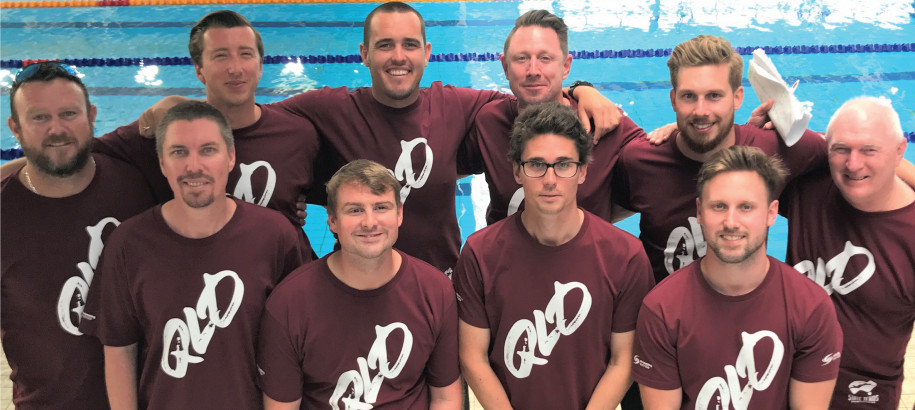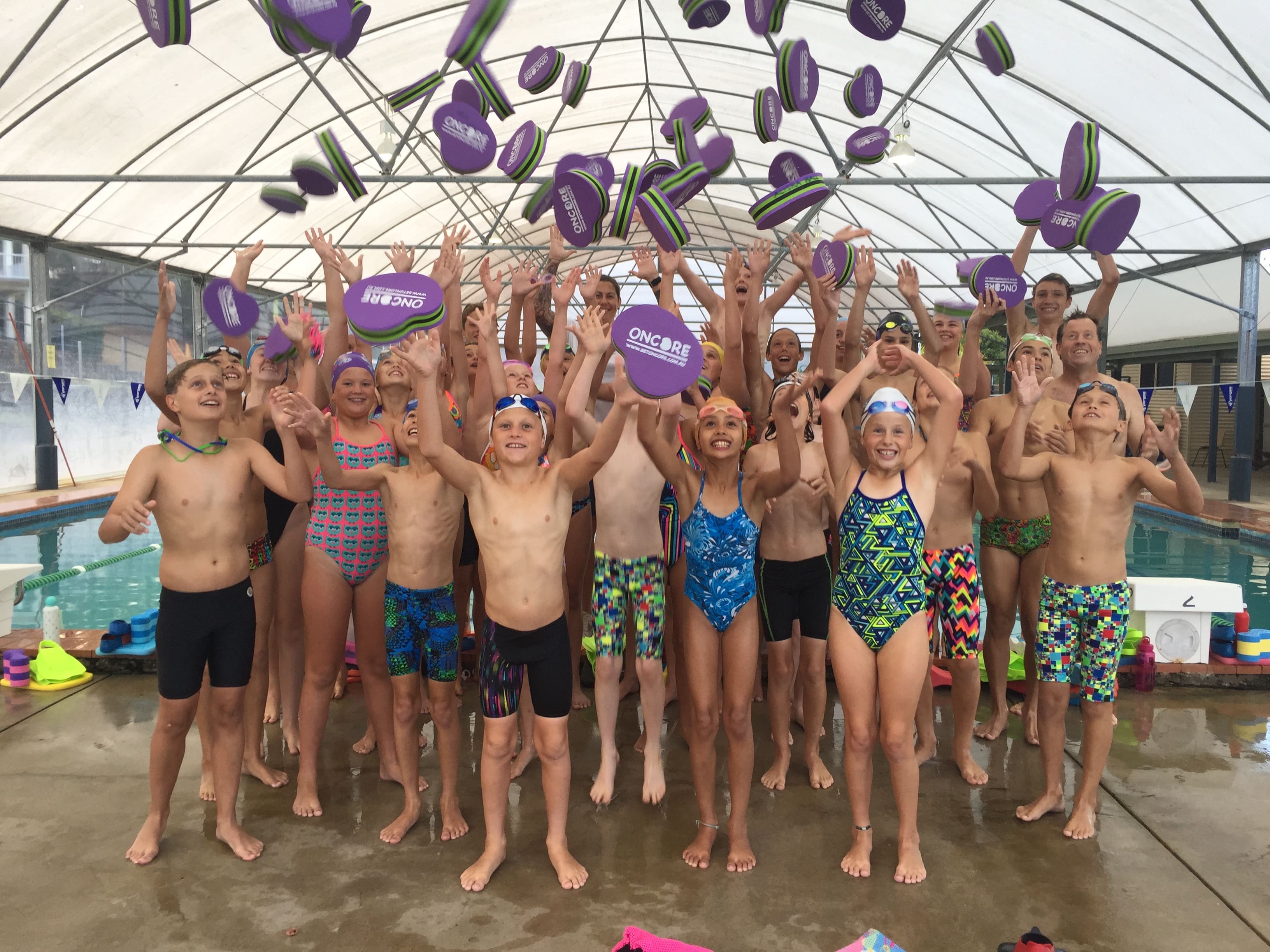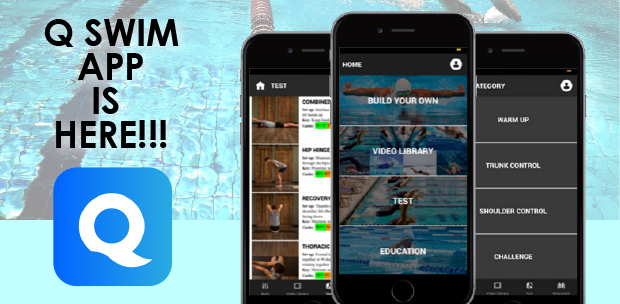
Coaches at all levels play a crucial role in ensuring that swimming is an enjoyable experience for everyone, as well as laying the foundation for the development of better athletes.
Coach education is a key component of Swimming Queensland's development strategy and below you will find some helpful resources to support your coaching career.
Technical Skills
- ONCORE (Aquatic Body Alignment)
- Race Skills
- Q Swim App

Focusing on fundamental aquatic skills, ONCORE improves body position, body awareness, shoulder stability, core strength, core body alignment, feel and hold in the unstable environment of water.
Through a wide range of drills, ONCORE engages key muscles from the catch of the stroke, through the shoulder and across the torso to the opposite hip. This allows the user the activate and strengthen important muscle cross-connections required for fast and efficient swimming.
Each season, selected members are introduced to these drills through SQ's Aquatic Body Alignment clinics as part of our overall Development Program.
If you would like to grab your own set of ONCORE to practice the drills you learnt, you can purchase it from the SQ Swim Shop. There are also great discounts available to clubs when buying multiple sets, just send us an email!

In 2018, Swimming Queensland joined with Australian Swim Team Physiotherapist Tom Barton to launch an innovative app – Q Swim. The Q Swim App was created by Tom to help coaches assess, track and address body position out of the pool.
To go faster, swimmers need to minimise their drag forces whilst maximising power generation. A key feature of the app for swimmers and coaches is the ability to quickly measure and compare screen shots against an 'ideal example’. The Q Swim App allows for a comparison between a swimmer, performing an element from their pre-swim warm-up routine, to a screen shot of Mitch Larkin, Olympic Silver Medallist and 2015 Dual World Champion, performing the same activity.
Coaches and athletes can use this feature to identify particular restrictions out of the water, correlate these with issues they are having in the water and use this information to select an appropriate intervention that aims to improve this restriction. The success of the intervention can then be reviewed using the same feature on the app.
With improved position and awareness, an athlete’s body is optimised for training and competition, leading to improved performance and less injury.
Users of the Q Swim App will be able to create and download customised pre-swim warm-up routines that target the entire body across 4 different challenge levels. By introducing the relevant pre-swim routine, an athlete will develop improved body position and control on land and this will readily transfer into the water.
The app will also deliver the best and most up-to-date educational resources, covering topics like coaching, physiotherapy, physiology and skill acquisition.
The Q Swim App was extensively field tested with coaches, physios and athletes testing the beta version.
We at Swimming Queensland, think it is both a valuable and affordable resource for athletes and coaches alike and you can subscribe for the low price of $1.99/month or $19.99/year, with the ability to cancel at any time.
For more information, check out www.qswim.co or visit @qswimapp on Instagram.
Athlete Management and Communication
- Beyond the Black Line
- NIF Framework
- Safeguarding Children & Young People Policy
- Member Protection Policy
- Improper Use of Drugs and Medicine Policy
- Competition Manipulation & Sports Gambling Policy
- Complaints, Disputes & Discipline Policy (CDDP)
- Code of Conduct
- Inclusive Swimming Framework
- Mutli Class
- SPADE Technique
- Long Term Athlete Development Strategy
Beyond the Black Line is more than an online resource. It’s a conversation starter to encourage the entire community to get behind our young swimmers. It’s a commitment that goes past a few extra cheers along the way.
BTBL focuses on sharing life experiences with young swimmers, facing the physical and emotional highs and lows of growing up. At the heart of this, are online videos and face-to-face workshops featuring past and present Australian Dolphins.
It’s all about openly talking things through and creating the right sport and life balance. So we can all continue to be the best we can be – both in and out of the pool.
Find out about the program including how you can access it at your Club on the program website!
Swimming Australia’s National Integrity Framework applies to all Activities organised or authorised by Swimming Australia or a Member Organisation.
What is Sport Integrity?
Integrity in sport means that athletes, supporters and fans can participate and celebrate sport, confident in the knowledge that they are part of a safe, ethical and inclusive environment.
Any threats to the integrity of sport (such as competition-manipulation, doping, and behaviours that impact people’s positive experience of sport, such as discrimination or abuse) are taken seriously by Swimming Australia.
Commitment statement
Swimming Australia and its Member Organisations remain fully committed to the protection of children, young people and all members in our sport and encourage swimming clubs throughout Australia to familiarise themselves with the policies and to raise the issue of child safety to everyone involved in their club.
We are committed to providing children and young people with positive and nurturing experiences and will strive to ensure that children and young people are protected from harm.
We aim to ensure that swimming is a safe, fair and inclusive environment for all participants.
Policies
The National Integrity Framework (NIF) is a set of rules that all members of our sport need to follow when it comes to their behaviour and conduct in swimming including obligations to report misconduct. Those rules are contained in the following policies (available below):
These policies will be in force from 1 January 2024.
The introduction of the Inclusive Swimming Framework is intended to provide the swimming and aquatics industry with a consistent approach to enabling access and participation. It is an approach that highlights the common factors that contribute to achieving diversity, rather than focusing on difference.
Swimming Australia’s purpose is to inspire Australians to be the best swimmer they want to be. To fulfil this purpose we have identified three strategic pillars - People First, Lifetime Participation and Peak Performance. The Inclusive Swimming Framework has links across all key strategic pillars of the organisation. It applies at all levels of the sport from grassroots participation to the podium and in the administration of SAL and its stakeholders.
Download the Inclusive Swimming Framework to read more.
Working with swimmers with an impairment often requires a coach to employ various techniques to modify movement or sets within a training environment. Watch he video below to gain an understanding of the classification and multi class system in Australia.
Coaches, often find themselves pulled in many different directions between athletes, other coaches, parents, and committee members. As a result, they are often required to have challenging conversations on a range of topics.
The SPADE Technique offers a great solution for coaches entering into challenging conversations.
There is an increasing interest in the longitudinal development of athletes in all sports. Long Term Athlete Development (LTAD) has become a popular notion with many western sports policy makers and National Sport Organisations.
The average age of the Australian swimmers in Beijing (2008) was 23 years with none of our men’s team below the age of 20 years. This reflects the trend towards older and more mature athletes staying in competitive swimming.
Another interesting fact from the Beijing Games was that the Gold Medallists in Swimming had an average age of 22.2 years – 23.9 (Men); 20.4 (Women).
Therefore, coaches, parents, administrators and athletes need to have a long-term view for our sport.
Read the full discussion paper explaining Long Term Athlete Development by National Youth Coach (2011), Vince Raleigh.
Athletes and Parents
- Clearing House Junior Sports
- Athletic Development
- Nutrition
- Athlete Recovery & Sleep
- ASADA Anti-Doping Information
- Play by the Rule Online Courses
- Useful Websites and Apps
Sport participation during childhood offers many immediate and long-term benefits; including the formation of positive physical activity behaviours, development of life-skills and physical literacy, and cognitive and social functioning.
Policies and strategies that promote enjoyable and challenging junior sport experiences will encourage greater participation as well as target personal and social development outcomes.
Clearing House have plenty of useful resources to enhance your coaching for junior members. Check them out on their website.
Swimming Queensland engage Sam Mathers from Fitter Futures for their Athletic Development Program and Support.
The food we eat has a direct impact on athletic performance and overall health and wellbeing. When involved in sport and wanting your body to perform at a certain level, it's essential to be choosing the best food options.
This article has been written by Sports Dietitians Greg Shaw and Steph Gaskell and includes fantastic tips on the swimming nutrition jigsaw puzzle!
Getting through a school day can be a challenge for young swimmers, so having the right mix of foods in your lunch box can be a huge help! This article outlines what you can put in your lunch box to make sure you are getting the right mix of foods throughout your day!
An athlete's recovery is very important to enable the best effort to be given in their regular training environment, as well as during times of competition. Sleep is an essential component and is especially crucial during adolescents where the body is growing at a fast rate.
The Australian Institute of Sport has some great tips for making the most of your sleep.
The Gatorade Sports Science Institute published an interesting study on sleep and the benefits for elite athletes.
In a study published in the Sports Medicine Journal in 2014, there were some interesting findings around nutritional interventions that can enhance sleep for athletes.
Swimming Australia provides an extensive list of anti-doping resources, including the latest policies, supplement warnings and the most recent Prohibited List. It is important that all athletes keep up to date with anti-doping information as there may be slight changes each year that could affect them.
The Play by the Rules online training section is for everyone involved in sport and recreation organisations, including: coaches, administrators, officials, players, parents and spectators.
They offer free courses on some of the most important topics in sport, including: child protection, harassment and discrimination and complaint handling. They also offer free online training for Member Protection Information Officers (MPIOs).
By taking these courses you will upgrade your knowledge and skills, which will help to create safer, fairer and more inclusive environments for all people involved in sport.
The courses have been developed in consultation with sports experts who work in these areas. They are short, user-friendly and feature the latest interactive technology, including case studies, practical scenarios and a quiz. The modules may be done in part, or all at once.

